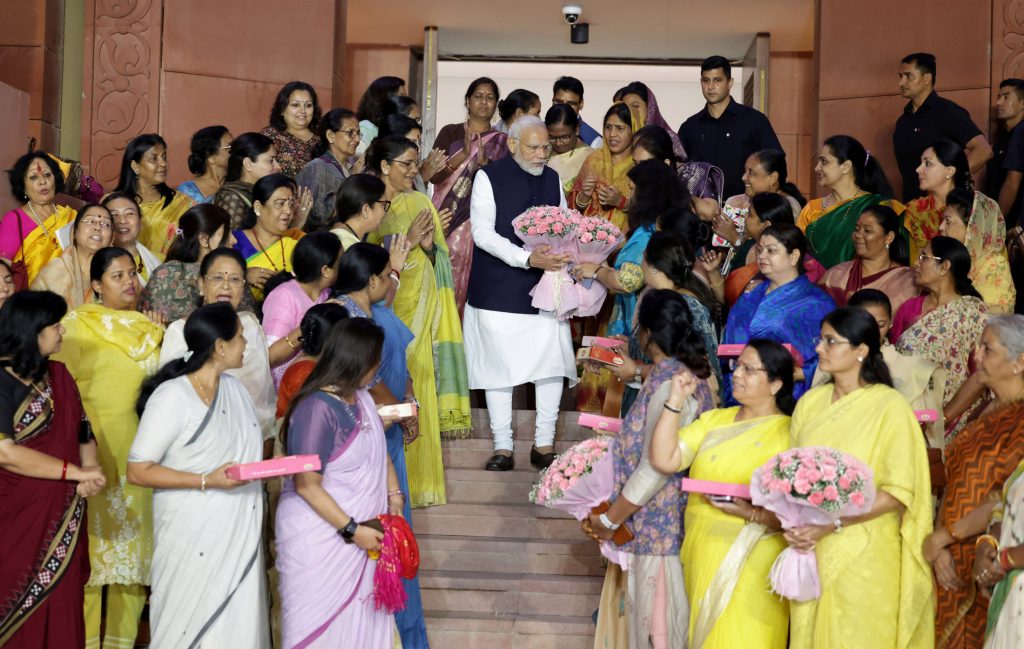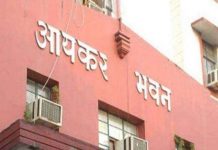
It is good that women from the SC, ST communities have been given a quota in the Women’s Reservation Bill but the voices of the OBC and EBC women need to be given representation in politics too.. A report by R Dyes
In 1865, the poet Wallace wrote “For the hand that rocks the cradle, is the hand that rules the world”, while talking about the impact and influence of women in the world through motherhood.
However, notwithstanding their impact and influence on the personalities of their children through upbringing, women, by and large remain behind the curtains and highly under-represented in politics in most parts of the world. While it is difficult for women to make it into politics, it is particularly true of women who belong to marginalized communities in countries like ours. That is why empowering them by giving them an opportunity to represent their communities in state Assemblies and the Parliament is crucial.
Recently, the Narendra Modi-led Government at the Centre cleared the historic Women’s Reservation Bill during a special session of Parliament. In a nutshell, the Constitution 108th Amendment Bill, 2008 seeks to reserve 33 per cent of the total number of seats in legislative Assemblies and Parliament for women.
Needless to say, the move was highly appreciated and hailed by all, as it was a culmination of decades of struggle and pushing by enlightened women, rights activists and right-thinking politicians for greater representation of women in politics. The debate on it started even before the Independence and in the Constituent Assembly and inch by inch the battle was fought and the ground was made by different generations of leaders and politicians in India to ensure women get their rights.
First, it was the visionary Rajiv Gandhi government in 1987 that set up a 14-member committee under Margaret Alva, which recommended the reservation of seats for women in elected bodies. In May 1989, then Prime Minister Rajiv Gandhi introduced the Constitution Amendment Bill, to provide 33 per cent reservation for women in rural and urban local bodies but the Bill, which was passed in Lok Sabha, failed to make it in the Rajya Sabha. Then in 1992 and 1993, then Prime Minister PV Narasimha Rao managed to get the Bill passed by both the Houses and today there are nearly 15 lakh elected women representatives in panchayats and nagarpalikas across India.
Not content with that, the Deve Gowda government gave another push for greater representation of women in politics and on September 12, 1996, it introduced the 81st Constitution Amendment Bill in Lok Sabha for reservation of women in the Parliament. Sadly, it failed to get approval in the Lok Sabha and was referred to a Joint Parliamentary Committee.
Then under the leadership of the visionary Atal Bihari Vajpayee, the government again pushed the 81st Constitution Amendment Bill in the 12th Lok Sabha in 1998 and this time, too, it failed and lapsed. Not one to give up, the poet Prime Minister subsequently reintroduced the Bill in 1999, 2002 and 2003 but to no avail.
Years later, the Manmohan Singh government tabled it on 6 May 2008 in the Rajya Sabha to prevent the Bill from lapsing like it did again and again in the Lok Sabha. It even got the stamp of approval from the Union Cabinet in February 2010 and was eventually passed in the Rajya Sabha on March 9, 2010.
However, the Bill was never taken up for consideration in the Lok Sabha and eventually, it lapsed in 2014 with the dissolution of the Lok Sabha.
The struggles of decades by different like-minded people came to fruition on September 21 this year with the passage of the Women’s Reservation Bill in both Houses of Parliament.
Now, the women of India will have a third of their representatives in the Lok Sabha, the Rajya Sabha, and the State assemblies, hopefully giving voice to their demands and the issues faced by them.
There are those who question the whole concept of quota as a means for empowerment, but look at what reservation for women at the Panchayat level did for them and their communities. Most women who are elected as the ‘mukhiya’ say that had it not been for reservation they would never have stood a chance to contest the election even at such a grassroot level. There are several villages around India that have benefited greatly from having women at the helm, especially where the areas of health, sanitation, school-level education, micro-finance, self-help groups and women-related issues are concerned because women are closely associated with these issues in their homes and when they are given the power, they work to improve these very aspects that are so close and vital for the betterment of the community.
Significantly, the Women’s Reservation Bill proposes sub-reservation for SCs, STs and Anglo-Indians within the 33 per cent quota. It also says that reserved seats may be allotted by rotation to different constituencies in the state or union territory, just like they are done for the panchayat elections.
However, due to the Government putting a rider that the legislation will come into effect after the next delimitation exercise, which might be conducted after the first census to be taken after 2026, the women of the country will have to wait longer to get their due.
One wishes that this was going to come into effect from the 2024 election only because looking at the plight of women belonging to the SC and ST communities in the country, one does not want their empowerment to be delayed any longer than it necessarily has to. Because, the truth of the matter is that more than the urban and upper caste women it is the women from the rural areas and particularly the marginalized communities like the SC, ST, EBC and OBC who need to be empowered because they are the ones who suffer the most due to circumstances of their birth.
Every other day we come across news or revolting and appalling videos of people, men and women alike, from these marginalized communities being subjected to inhuman treatment and humiliation at the hands of the upper caste people, even in urban spaces, let alone Tier 2-3 cities and villages.
While one can understand (though not condone) that people in rural areas are not that well-educated and aware of human rights and are still living in the past, so they continue to labour under age-old biases that have been ingrained and reinforced by their environment, but when the educated and urban people commit atrocities on people of marginalized communities it is absolutely unacceptable. What is the point of being educated if you can’t overcome the caste biases?
Look at the sexual violence faced by India’s 80 million Dalit women, who comprise about 16 per cent of our country’s female population. They have to bear the burden of poverty, lack of education, gender bias and violence and caste-based inequity. The lot of women belonging to the ST, EBC and OBC communities is no better.
If we were to put all this in numbers, then according to the National Crime Records Bureau’s statistics for 2021, crimes and atrocities against SCs increased by 1.2 per cent with Uttar Pradesh reporting the highest number of cases at 25.82 per cent, followed by Rajasthan with 14.7 per cent and Madhya Pradesh with 14.1 per cent.
It reported that atrocities and crimes against STs increased by 6.4 per cent with Madhya Pradesh reporting the highest number of cases at 29.8 per cent followed by Rajasthan with 24 per cent and Odisha with 7.6 per cent.
Cases of rape against SC women and girls account for 7.64 per cent and ST women and girls account for 15 per cent out of the total cases reported in India. Other crimes like attempt to rape, assault on women to outrage their modesty, and kidnapping of women and minors cumulatively stood at 16.8 per cent in SC women and girls and at 26.8 per cent in ST women and girls.
The report also highlighted the sad and frightening fact that getting justice for these marginalized communities is a pipe dream. As per the report, 70,818 cases of atrocities against SCs were pending investigation at the end of 2021 and 12,159 cases of atrocities against STs were pending investigation too.
The lot of women belonging to the OBC, EBC communities is not any better. Hence, they need to be empowered too as they are equally marginalised, oppressed, subjected to humiliation, inequity, gender based violence, sexual violence and deprivation for centuries. Why are they being left out of this legislation? Don’t they need help? Don’t they deserve to be uplifted? Don’t they deserve to have their issues heard in the Parliament?
It is good that the SC, ST women have been given a quota but the voices of the OBC and EBC women need to be given representation in politics too.
Experts say that the Constitution of India, as it stands, does not provide for political reservation to OBCs in the Lok Sabha or state Assemblies. They say that only if the Constitution is amended to provide political reservation to OBCs can any backward sub-quota kick in as the Constitution mandates gender equal quotas. However, the existing SC, ST quota in the Constitution applies to both men and women. So in order for OBC women to have a place in the reservation Bill, the Constitution will have to be amended.
So be it! Why can’t the Constitution be amended to right a centuries-old wrong? As it is, the Women’s Reservation Bill has been a long time coming and the time to implement it is now. The marginalized women of this country have waited long enough. They should not be made to wait any longer.
Another sore point is that the Bill says that the reservation of seats for women shall cease to exist 15 years after the commencement of the amendment Act. This needs to change because we all know that 15 years is not a long enough time to empower women, especially those from marginalized communities as they have been subjugated for centuries. How can the injustices of centuries be wiped out in 15 years?
This Bill, a culmination of decades of struggle, is certainly a step in the right direction but the above-mentioned issues with it have to be sorted out if it is to have a real impact on the ground. Then and only then will the hand that rocks the cradle will rule the world, because it will be the hand of a strong and empowered woman with a voice of her own and not a hand that is stretched out seeking help.












